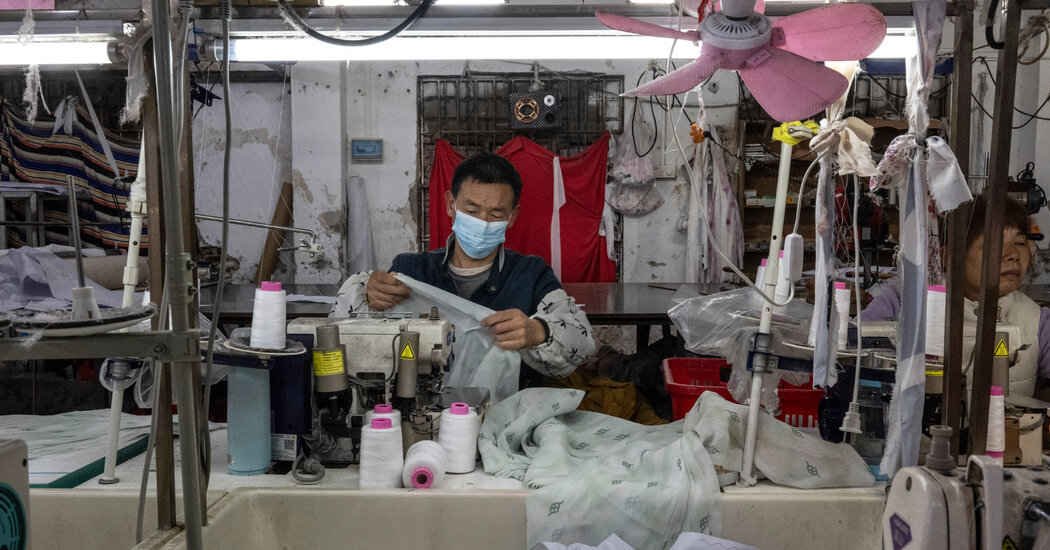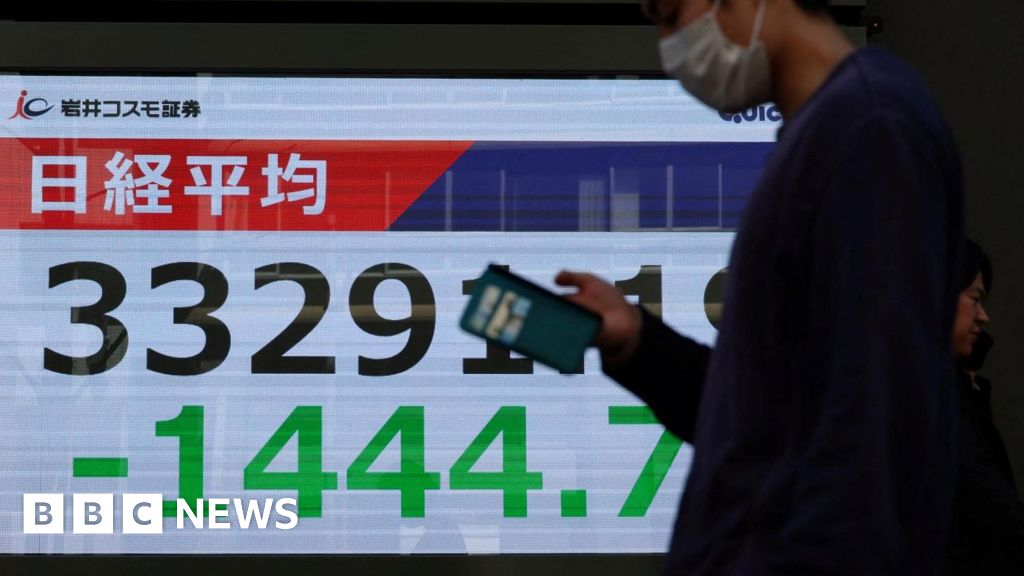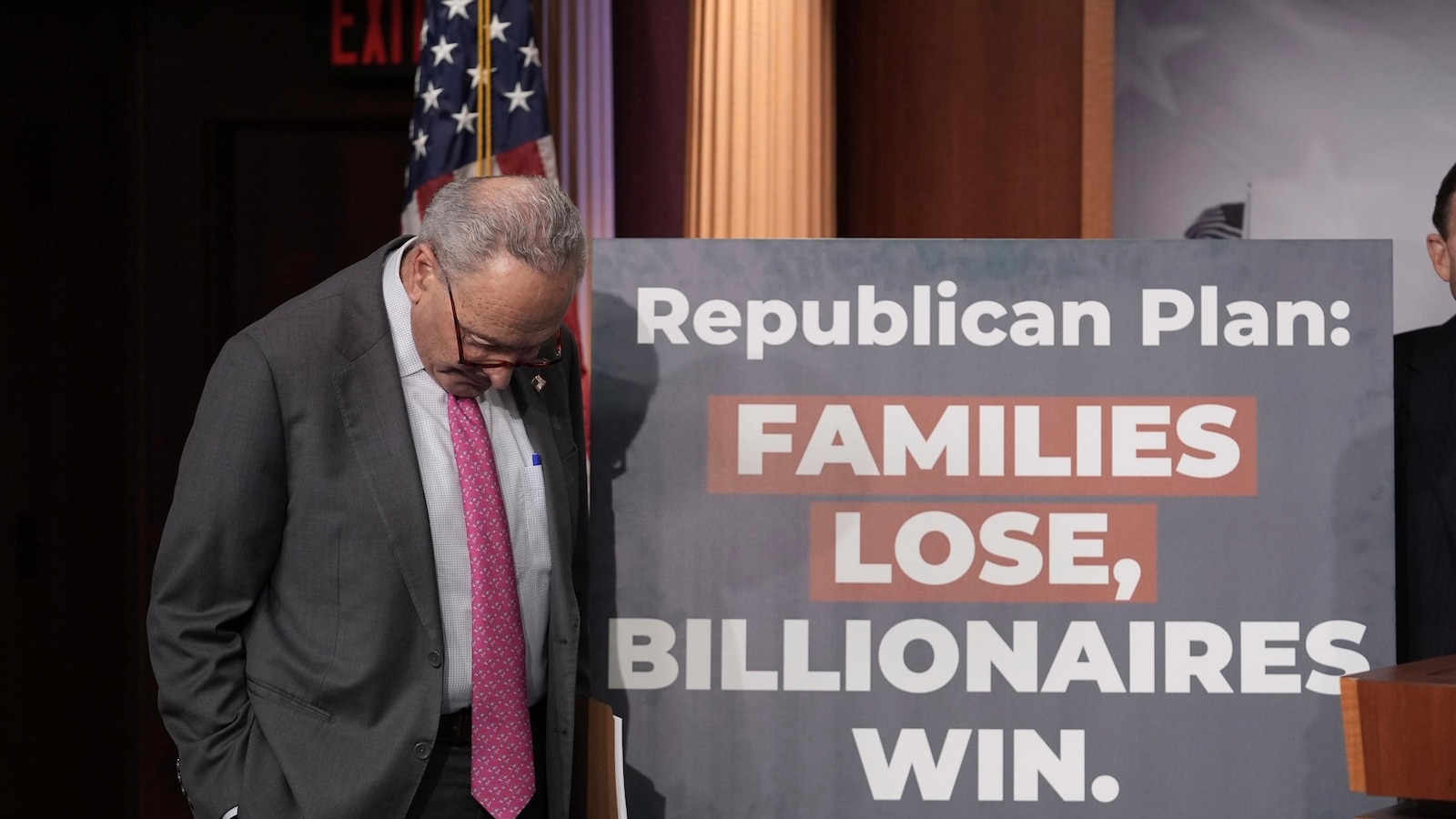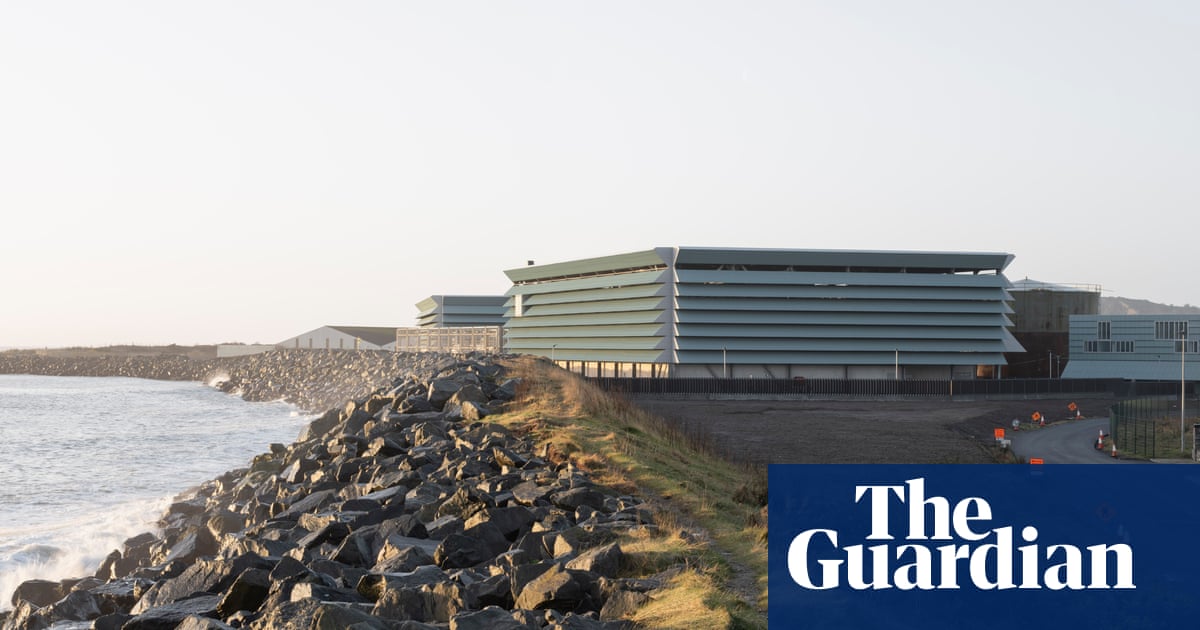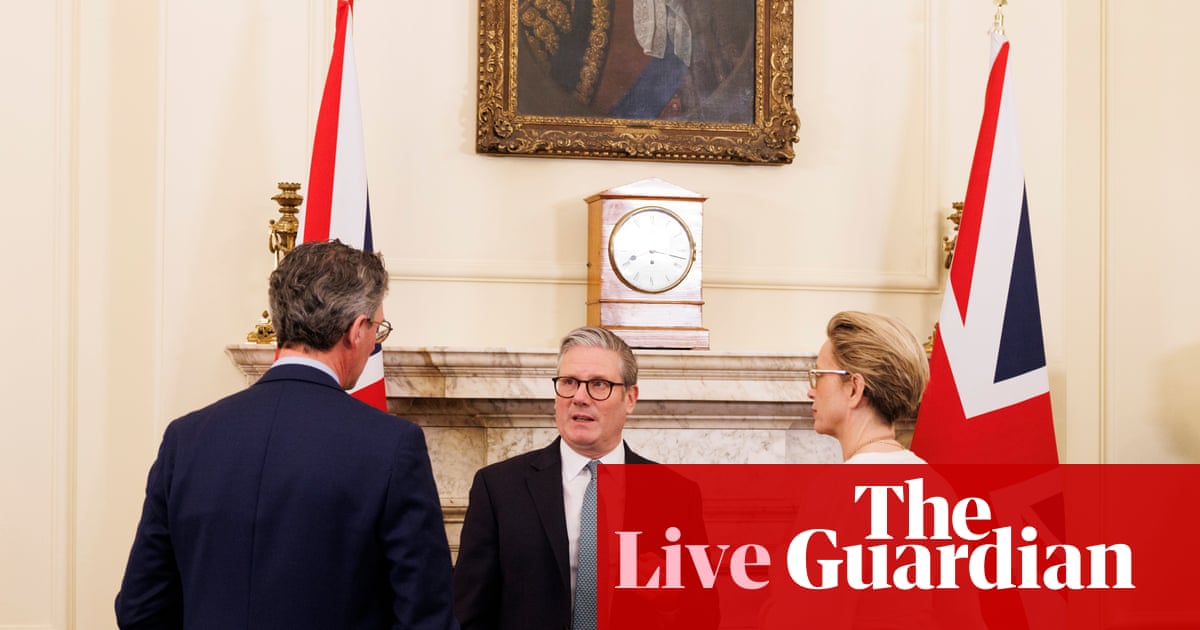
Starmer warns Trump’s US tariffs not just ‘short-term tactical exercise’ – UK politics live
Starmer says Trump tariffs are start of ‘new era’, and not just ‘short-term tactical exercise’
Some commentators have assumed that President Trump is just using tariffs as a negotiating ploy. Given that he has announced tariffs on Canada and Mexico, only to cancel them very quickly, there is a theory that he is doing the same thing again, only on a global scale. Alternatively, there is a view that a prolonged, negative reaction – falling share prices, rising inflation, higher unemployment? – could lead him to change his mind quite soon.
During the Q&A at the Labour local elections campaign launch earlier, Keir Starmer in effect rejected all these theories. He said that what Trump was doing was the start of “a new era”.
And he explicitly compared the challenge posed by Trump’s economic policies to the challenge posed by his security policies, which have led to European countries ramping up defence spending.
In response to a question from Sky’s Beth Rigby, Starmer said:
There’s a really important moment here that we need to understand, because over the last few months we’ve been talking about a new era when it comes to defence and security, and recognising that we are in a changing world, going into a new era, and therefore we have to act and lead differently.
We’re at a similar point for trade and the economy. This is not just a short-term tactical exercise. It is the beginning of a new era.
We need to understand that, just as we’ve understood it for defence and security. We have to understand the changing world when it comes to trade and the economy.
And I’m very concerned that we get this argument out there because it means that we have to adapt in ways which go beyond the mere question of tariffs.
And that’s why I’ve instructed my team to go further and faster on what we need to do to put more resilience and more strength into our economy.
But Starmer did not really explore what the policy implications of this were. In his comments about strengthening the economy, he mostly spoke about things the government is already doing, such as planning reform. Some parties, like the Liberal Democrats, the Green party and Plaid Cymru agree with Starmer about the UK facing a new era, and argue that it is one that requires rejoining the EU single market or the customs union, but Starmer has shown no inclination that he agrees, and instead says the UK should not choose between the US and Europe.
Key events
Most Britons (67%) thinks the Trump tariffs will be bad for the UK economy, a YouGov poll suggests. But only 38% of them think the tariffs will be bad for their own household finances.
Scottish Tory MSP quits party saying it has become ‘Trumpesque in style and substance’

Libby Brooks
Libby Brooks is the Guardian’s Scotland correspondent.
The only out LGBT+ Scottish Tory MSP has quit the party which he accuses of being in a “grotesque dance” with Reform.
In an excoriating resignation letter to leader Russell Findlay, Jamie Greene said that the party was becoming “Trumpesque in both style and substance”.
Explaining that he had joined the party under David Cameron and Ruth Davidson, “the party that supported gay marriage, in which minority communities were welcome, which pledged commitment to a net-zero environment and which was a political ‘big tent and broad church’”, he warned that “we now run the very serious and immediate risk of becoming once again the party of social division and morality wars.”
Greene, a highly able politician and thoughtful chamber contributor, was widely considered a rising star in the party before he was axed from the frontbench by former leader Douglas Ross, apparently in retaliation for Greene’s (qualified) support for gender recognition reform. Last autumn, he was an early candidate in the race to replace Ross, but stepped back in order to support party veteran Murdo Fraser, who lost to Findlay.
Attacking Findlay’s “Reform-lite” agenda, Greene added:
Chasing the votes of Reform party supporters will never see the Scottish Conservatives in government. There simply aren’t enough fringe rightwing Scottish voters to achieve that.
While Greene’s discomfort with the party’s direction of travel is not news, his decision to quit altogether is a significant indication of just how concerned and alienated the tranche of the Scottish party attracted by Ruth Davidson’s inclusive approach now feel.
The Liberal Democrats have described today’s government consultation on retaliatory tariffs against the US as “too little, too late”. Clive Jones, the Lib Dem trade spokesperson, said:
It is right that all options are on the table in response to Trump’s destructive trade war, but what the government has put forward is too little, too late.
This is work that should have been done as soon as Trump entered office and it appears ministers have been caught on the hop by this announcement.
It is time for UK to engage with our Commonwealth and European allies and bring together a coalition of the willing to stand tall against Trump’s trade war and protect our national interest.
Starmer says Trump tariffs are start of ‘new era’, and not just ‘short-term tactical exercise’
Some commentators have assumed that President Trump is just using tariffs as a negotiating ploy. Given that he has announced tariffs on Canada and Mexico, only to cancel them very quickly, there is a theory that he is doing the same thing again, only on a global scale. Alternatively, there is a view that a prolonged, negative reaction – falling share prices, rising inflation, higher unemployment? – could lead him to change his mind quite soon.
During the Q&A at the Labour local elections campaign launch earlier, Keir Starmer in effect rejected all these theories. He said that what Trump was doing was the start of “a new era”.
And he explicitly compared the challenge posed by Trump’s economic policies to the challenge posed by his security policies, which have led to European countries ramping up defence spending.
In response to a question from Sky’s Beth Rigby, Starmer said:
There’s a really important moment here that we need to understand, because over the last few months we’ve been talking about a new era when it comes to defence and security, and recognising that we are in a changing world, going into a new era, and therefore we have to act and lead differently.
We’re at a similar point for trade and the economy. This is not just a short-term tactical exercise. It is the beginning of a new era.
We need to understand that, just as we’ve understood it for defence and security. We have to understand the changing world when it comes to trade and the economy.
And I’m very concerned that we get this argument out there because it means that we have to adapt in ways which go beyond the mere question of tariffs.
And that’s why I’ve instructed my team to go further and faster on what we need to do to put more resilience and more strength into our economy.
But Starmer did not really explore what the policy implications of this were. In his comments about strengthening the economy, he mostly spoke about things the government is already doing, such as planning reform. Some parties, like the Liberal Democrats, the Green party and Plaid Cymru agree with Starmer about the UK facing a new era, and argue that it is one that requires rejoining the EU single market or the customs union, but Starmer has shown no inclination that he agrees, and instead says the UK should not choose between the US and Europe.
Keir Starmer
Plaid Cymru says the government should respond to the Trump tariffs by cutting trade barriers with the EU. Speaking in the Commons earlier, Liz Saville Roberts, the Plaid leader at Westminster, said:
Some commentators are fawning over a 10% tariff simply because our nearest neighbours have been hit worse.
Let’s get real here. The 25% tariff on steel and aluminium will hit Wales’s biggest export to the US – machinery and transport equipment.
And it’s a fact that the EU is Wales’s greatest trading partner with Welsh exports valued at £11.2bn.
In the face of an American president with an obsession with international economic revenge … it is economic common sense to accelerate scrapping trade barriers with Europe.
Luton airport allowed to double capacity after UK government overrules planners
Luton Airport will be allowed to almost double in capacity after the government overruled planning inspectors who recommended blocking the scheme on environmental grounds, Gwyn Topham reports.
On Wall Street, where the market has just opened, share prices are tumbling. Graeme Wearden has the details on his business live blog.
Government publishes 417-page list of US goods that could be affected by retaliatory tariffs as it opens consultation
The government has launched its online consultation on potential retaliatory tariffs against the US. There are details about how to respond here.
It includes a 417-page list of US goods that might be subject to tariffs. The government wants to know from businesses how they would be affected by particular tariffs. In its news release, the Deparment for Business and Trade (DBT) says:
UK companies are being invited to give their views on what any future UK response should look like by providing feedback to questions asking them the average value of their US imports, the impact of any possible UK tariffs and how they would adjust to them.
The department says the fact that an item is on the 417-page list “does not mean that it will appear in any UK tariff response, should the UK choose to impose tariffs on US goods at all”.
It also says the government would not impose tariffs on “products in the wider public interest issues such as medical supplies and military equipment”.
The consultaton will run for four weeks. But the government is not promising a speedy decision when it closes, on Thursday 1 May. “Once the request for input closes, the government will reflect on the feedback and consider how best to respond,” the department says.
The department also says tariffs are a “last resort”. Ministers are still hoping to a negotiate a deal with the US on trade that would lead to the current tariffs imposed on the UK being reduced or eliminated.
Business groups back Starmer’s ‘cool and calm’ response to Trump tariffs
Business groups have strongly welcomed the government’s decision not to announce immediate retaliatory tariffs against the US, but to instead keep talking to the US about a trade deal that might lead to tariffs being removed. One organisation, the CBI, even adopted Keir Starmer’s language about being “cool and calm”. (See 9.06am.)
This is what three of the leading business groups are saying.
From Rain Newton-Smith, CEO at the CBI
Today’s announcements are deeply troubling for businesses and will have significant ramifications around the world.
A cool and calm reaction from the UK government is the right response: UK firms need a measured and proportionate approach which avoids further escalation. Retaliation will only add to supply chain disruption, slow down investment, and stoke volatility in prices.
From Emma Rowland, trade policy adviser at the Institute of Directors
The implementation of these ‘Liberation Day’ tariffs will be a blow to British businesses, eliminating any hopes that the UK would be able to avoid the crosshairs of the global trade war …
The UK government has so far sought to pursue constructive engagement with the US administration and with other trading partners. We are supportive of this pragmatic and level-headed approach. The UK benefits from being an open trading nation, with strongly integrated international links. The IoD support the government’s efforts to sustain the position of UK exporters in an increasingly fragmented global economy.
From Shevaun Haviland, director general of the British Chambers of Commerce
The government has kept a cool head so far and must continue to negotiate. This is a marathon not a sprint, and getting the best deal for the UK is what matters most.
But no-one will escape the fallout from these decisions, there will be an increased risk of trade diversion, and it will wreak havoc on businesses communities across the world.
John Swinney tells MSPs Scottish government will stand ‘shoulder to shoulder’ with firms hit by tariffs

Severin Carrell
Severin Carrell is the Guardian’s Scotland editor.
John Swinney, Scotland’s first minister, has pledged to “stand shoulder to shoulder” with Scottish firms facing the 10% import tariffs proposed by President Trump.
He told MSPs during first minister’s questions he will meet Scotch Whisky Association officials in New York in coming days, when he takes part in the annual Tartan Week celebrations there, to discuss “the very significant issues” facing the sector.
Swinney was questioned by Russell Findlay, the Scottish Conservative leader, over the Scottish government’s “short sighted” decision to cancel an export strategy devoted to US trade last year.
The first minister sidestepped that specific point but insisted Scotland’s enterprise and export agencies were heavily engaged in promoting trade with the US, while Scottish ministers were closely cooperating with the UK government.
Scottish whisky producers sold nearly £1bn worth of produce in the US last year, roughly a fifth of the sector’s overall production, while Scottish salmon producers exported £225m last year to the US.
Swinney said:
The imposition of tariffs isn’t good news. It will be damaging for economic activity in Scotland, the UK, but also across the world and there will also be negative implications for the people of the United States.
I can assure Mr Findlay that this government will leave no stone unturned to make sure it can take forward the concerns of industry and work with the UK government.
No 10 says ‘basic protections’ for children in Online Safety Act not up for negotiation
At the Labour local elections launch this morning Keir Starmer strongly played down any suggestion that the Online Safety Act would be watered down as part of a UK/US economic deal – while not quite saying it would not feature at all. (See 12.38pm.) It has been reported that the UK could be offering a review of the legislation. (See 10.49am.)
At the Downing Street lobby briefing the PM’s spokesperson delivered a similar message – saying “basic protections” were not up for negotiaton. He said:
We’ve said previously our Online Safety Act is all about protecting children online, making sure what is illegal offline is illegal online. The technology secretary has reiterated that our basic protections for children and vulnerable people are not up for negotiation. That remains the government’s position.
Here is Guardian video of Keir Starmer giving his response this morning to the Trump tariffs announcement.
Reynolds urges MP ‘not to invent problems that don’t exist’, when asked about Online Safety Act being part of US deal
Bobby Dean (Lib Dem) says when US rightwingers talk about freedom of speech, they mean they want US tech companies to continue to be free to impose harmful content on children. He asks Reynolds to rule out the Online Safety Act being part of UK/US economic deal.
Reynolds urges MPs “not to invent problems that don’t exist”. He says the talks with the US are focused on “goods and services in the main”.
Reynolds say US tech companies will still have to pay ‘fair rate of tax’ in UK – without ruling out changes to digital services tax
Back in the Commons Lisa Smart (Lib Dem) asked Reynolds if the government would cut the digital services tax (DST) as part of its economic deal with the US.
Reynolds said he would not discuss the specifics of the negotiations. But he went on:
Making sure any tech company – not just a US tech company, any tech company – pays a fair rate of taxation in the UK for the economic activity that they have in the UK is something all parts of the British government are committed to, and [Smart] doesn’t need to be worried about that.
I would just say that there’s always going to be, in any discussion, a lot of issues that need to be dealt with, and in the main, those are trade issues.
I understand there’s all kinds of speculation. Speculation isn’t always correct, and I would just ask all colleagues to bear that in mind, understand we can’t publicly, in a negotiation like this, share every single aspect of it.
But if she’s worried about US companies, or any tech companies paying the right rate of tax in the UK, I can tell that’s something we’re deeply committed to.
Reform UK MPs criticised for missing Commons statement about Trump tariffs
In the Commons Blake Stephenson (Con) says the Trump tariffs will make “everyone poorer”. He says it is noteworthy that Reform UK MPs “have not bothered to turn up to share in our disappointment”.
Reynolds agrees, saying he is right to note the “conspicuous absence” of Nigel Farage and his colleagues.
Starmer repeatedly accuses Farage of ‘fawning over Putin’ at Labour local elections campaign launch

Ben Quinn
Ben Quinn is a senior Guardian reporter.
Keir Starmer has accused Reform UK of “fawning over Putin” as the prime minster used Labour’s local elections launch to turn maximum fire on Nigel Farage’s party over foreign relations and the NHS.
In a sign of how Labour views Reform as potentially a greater threat than the Tories, Starmer devoted more time to hitting out at Reform than at the Conservatives.
Labour chose a Derbyshire county council area voted the worst in Britain for potholes as location for the launch, during which Starmer accused the Tory-controlled local authority of being responsible for potholes and anti social behaviour.
But Starmer spared most of his ammunition for Reform, listing the rightwing voting record of the party’s MPs on workers rights and its position on the NHS.
“They claim to be the party of patriotism. I’ll tell you this, there’s nothing patriotic about fawning over Putin,” he said, during a speech and a Q&A with reporters where he used the phrase “fawning over Putin” three times.
Farage claims, if Tories had done better with Brexit, UK would have avoided tariffs because US deal would be in place
The US tariff announcement is difficult for Reform UK because the party, and its leader, Nigel Farage, are closely identified with Donald Trump, and Trump was deeply unpopular with British voters (including Reform UK supporters) even before yesterday. The tariffs will probably make him ever more toxic.
Reform does not seem to have issued any statement on the tariffs announcement last night.
But this morning Farage posted this on social media.
10% tariffs from the USA are bad news, but better than 20% for EU members.
If the Tory government had delivered quickly on Brexit we would have had a free trade deal years ago.
This deal is still achievable.
Ed Davey, the Lib Dem leader, responded with this.
If you’re such good mates with Trump, how about you pick up the phone and tell him to drop the tariffs?
The US hit countries they have trade deals with too. But we can always count on you to play the loyal sidekick to the bully Trump.
Reynolds says Online Safety Act has not been part of his trade talks, adding US ‘not seeking to make children unsafe’
Munira Wilson (Lib Dem) asks Reynolds to refuse to water down “in any way, shape or form” the Online Safety Act.
Reynolds says his talks with his US counterpart have not covered this issue.
And he says the US “is not seeking to make our children unsafe”. He goes on:
I think sometimes the Liberal Democrats are inventing problems to try and propose that they are the solution to them. This is a conversation about trade, and I think it’s just vitally important we keep it in that important and appropriate terms.



